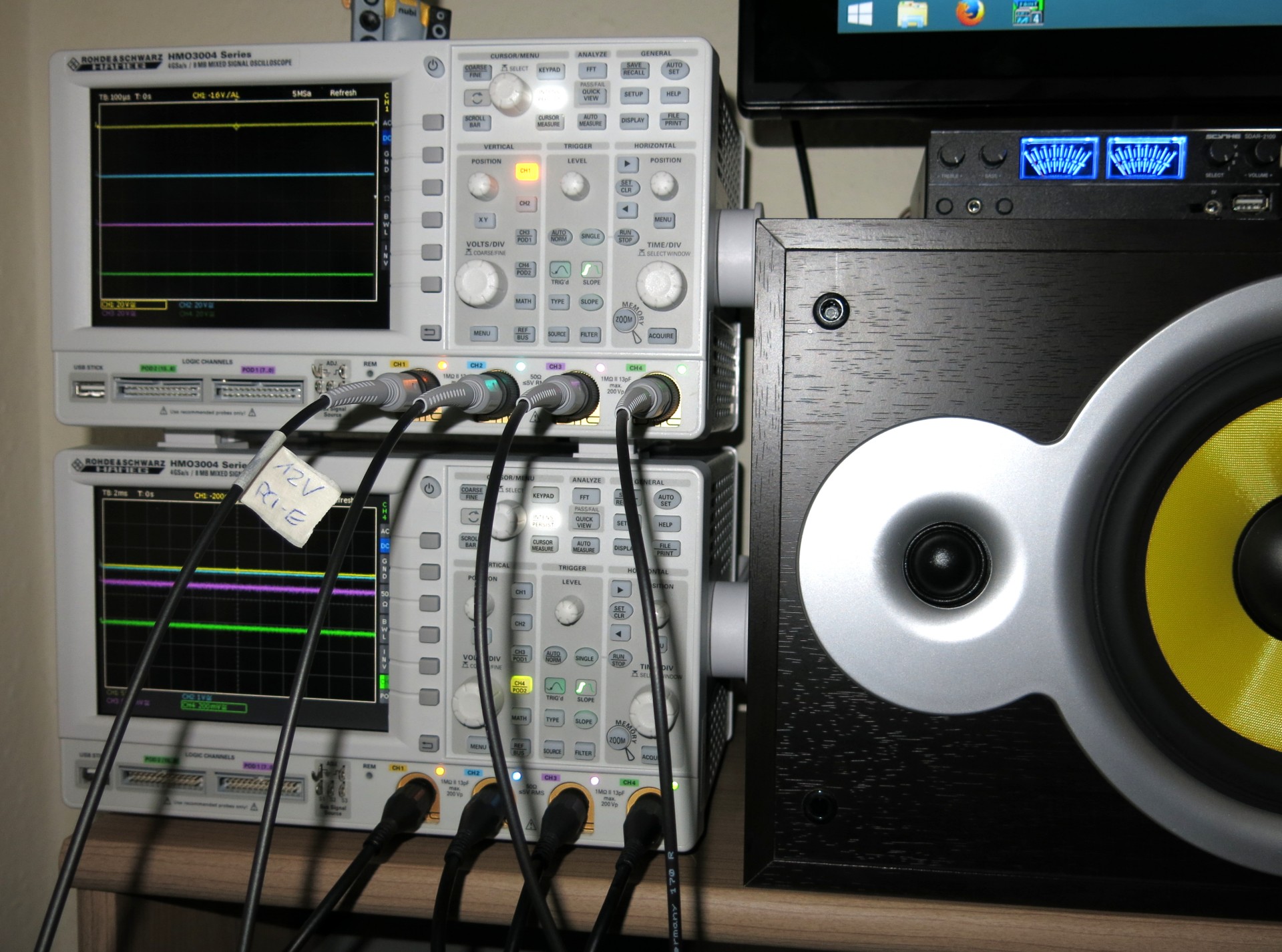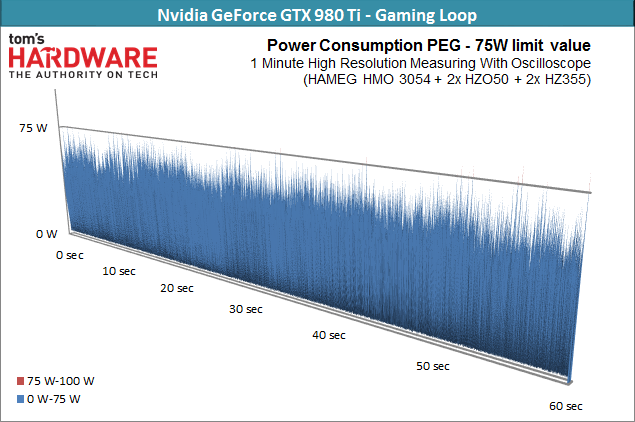Nvidia GeForce GTX 980 Ti 6GB Review
Power Consumption
Power Consumption Measurement for Different Applications
We measure the power consumption of these graphic cards as described in The Math Behind GPU Power Consumption And PSUs. It's the only way we can achieve readings that facilitate sound conclusions about efficiency. Once again, we’re using picture galleries to provide a detailed breakdown of the results across all the rails and connectors for those interested.
When you look at the tables, bear in mind that the overall results for all rails is not calculated by adding the numbers in the column above them. The maximum or minimum figures do not always occur at the same time on all rails. So, the overall results represent how high the power draw was across all rails at the same time.
Idle and 2D Desktop
Power consumption comes in at 10W, which is certainly good. However, based on observing the individual rails, it’s also clear to see that there are many load fluctuations. The 10W result is really just the average of a lot of ups and downs.
| Header Cell - Column 0 | Minimum | Maximum | Average |
|---|---|---|---|
| PCIe Total | 0.98W | 30.24W | 7.44W |
| Motherboard 3.3V | 0.94W | 2.11W | 1.01W |
| Motherboard 12V | 1.20W | 12.60W | 2.20W |
| Motherboard Total | 2.12W | 13.66W | 3.21W |
| Graphics Card Total | 5.12W | 38.33W | 10.35W |
Gaming Loop
Aside from stress testing (and depending on the game, of course), this is where we see the highest power consumption. A measured average of 233W is a little higher than the GeForce GTX Titan X’s 224W. This doesn’t really come as a surprise though, since Nvidia's GeForce GTX 980 Ti boosts its core clock rate a bit higher than the Titan X after it warms up and reaches its temperature target.
| Header Cell - Column 0 | Minimum | Maximum | Average |
|---|---|---|---|
| PCIe Total | 34.16W | 358.80W | 184.05W |
| Motherboard 3.3V | 1.19W | 3.43W | 2.26W |
| Motherboard 12V | 20.16W | 80.52W | 47.17W |
| Motherboard Total | 22.27W | 83.03W | 49.43W |
| Graphics Card Total | 66.08W | 428.38W | 233.48W |
Stress Test
The GeForce GTX 980 Ti’s TDP is 250W, according to Nvidia. But it never reaches that number under normal conditions, except in certain professional applications. None of the usual stress tests manage to push it past the 254W mark. Taking the 233W gaming power consumption into consideration, 19 to 22W of headroom remain for overclocking. These are just idle musings for a reference-class GeForce GTX 980 Ti, though, since it runs into a thermal limit anyway. There’d be a bit more headroom with a higher-capacity cooling solution, even if this one is optimized for Nvidia's 250W cards.
| Header Cell - Column 0 | Minimum | Maximum | Average |
|---|---|---|---|
| PCIe Total | 30.24W | 236.88W | 199.57W |
| Motherboard 3.3V | 1.32W | 3.30W | 2.24W |
| Motherboard 12V | 22.80W | 70.56W | 52.41W |
| Motherboard Total | 24.91W | 72.67W | 54.65W |
| Graphics Card Total | 65.24W | 296.84W | 254.22W |
Nvidia should be commended once again for doing a great job limiting its new card’s power consumption via the motherboard’s PCIe slot to under 75W. Load spikes, which we often see even from mainstream graphics cards, are practically nonexistent. Dynamic power distribution across the rails functions perfectly and without a hitch.
Power Consumption Overview and Comparison to Other Graphics Cards
Here’s a lengthy comparison of where the GeForce GTX 980 Ti stands compared to its competition.
Get Tom's Hardware's best news and in-depth reviews, straight to your inbox.
Current page: Power Consumption
Prev Page Thief And Tomb Raider Next Page Temperature, GPU Boost And Noise-
Larry Litmanen How important is gaming to you if you spend $500 on GPU and $500 on a monitor?Reply
I guess i am the only one paying for rent out there. -
alidan ReplyHow important is gaming to you if you spend $500 on GPU and $500 on a monitor?
I guess i am the only one paying for rent out there.
i personally find 4k at sub 48 inch stupid... but than again, i had 800x600 monitors at 15 inches and played some games at 640x480 on 17 inch screens, i also played ps1 games, so once hd came around and was single gpu at 1080p i had no issues whatsoever with jaggies any more.
im not paying 500+$ for AA
im also not sacrificing that much processing power for AA
hell im 1920x1200 at 24 inch... i dont use aa.
granted, a monitor could last you 5+ years if you get a good one so you can see it as an investment, and a gpu, im learning more and more if you sell your high end gpu the moment a new high end gpu comes out, you can get a sizeable upgrade every year for under 100$ and you over all come out ahead.
sorry im tired as hell, i just realized i dont know which way to meant your comment to be taken. -
Shankovich I'm writing this as seriously as I can, not being a fanboy: What is the purpose of the Titan X at this point? It lost its DP performance that made it a fantastic workstation-gaming hybrid. Also, it really sucks for people who bought a Titan X just a little over a month ago? That's ~$350 down the drain pretty much. Yea the Titan X has all that extra VRAM, but for what? 3 4K displays maybe, at which point a 980ti SLI would probably lose by about ~5% due to a few less CUDA cores.Reply
Again though, for most customers, the 980ti is the obvious choice. I just feel like nVidia totally screwed over most of their Titan X customers now. And why? Well, I really think the 980ti will be the cheaper answer to AMD's Fury or whatever Fiji will be called, Really interested to see how it will do. If Fiji beats the Titan X/980ti, it's rumored $800 price point would make the 980ti a somewhat compelling offer depending on how well it does.
In the end, I'm loving this competition! -
wedouglas ReplyHow important is gaming to you if you spend $500 on GPU and $500 on a monitor?
I guess i am the only one paying for rent out there.How important is gaming to you if you spend $500 on GPU and $500 on a monitor?
I guess i am the only one paying for rent out there.How important is gaming to you if you spend $500 on GPU and $500 on a monitor?
I guess i am the only one paying for rent out there.
If you don't have $1000 of discretionary income each year, you need a better job. Better question would be, what adult doesn't have $1000 for a graphics card and a monitor? -
Eggz SOOOOO glad you're finally including the 780 ti in the graphs again! There were a lot of people with this card, and excluding it from the Tom's graphs made things harder to assess. Thanks!Reply -
damric This GTX 980 Ti seems significantly better price/performance than the GTX 980. I will be recommending these for higher end builds.Reply -
photonboy My first considered card since my GTX680 2GB. My only complaint is:Reply
NVidia only reference model? (sigh)
I get the reasons. Minimal competition plus overclocking with better cooler beats Titan X hands down (for gaming). Plus, maybe we'll see non-reference later.
FYI, the EVGA 980 Hybrid got 1600MHz on GPU. That's a fan on main card for VRM's etc and Liquid cooler loop just for GPU with 12cm rad/fan. Even if it "only" got 1300MHz for 980Ti that's still a 30% boost over stock 1000MHz but maybe 1500MHz is actually possible?
So.. I'll wait a bit longer thanks. -
turkey3_scratch This really seems like a great card! Those frame charts show fantastic improvements over the 980. I was expecting more of a middle-ground between the Titan X and the 980 but it practically matched the Titan X's performance spot-on! All for $375 less.Reply





